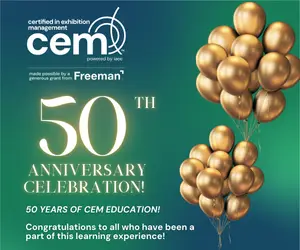Editorial Note: Originally published in the June 2025 issue of Trade Show Executive magazine.
The U.S. workforce is experiencing big changes as the so-called “Peak 65” phenomenon presents both profound challenges and unprecedented opportunities. With approximately 11,000 Americans turning 65 daily in 2025, we are witnessing a generational transition that demands strategic and proactive thinking.
For decades, institutional knowledge has been one of our most valuable assets. Experienced professionals bring to the table decades of nuanced understanding about exhibition and event planning, stakeholder management, and industry dynamics. As this generation – and the wealth of knowledge it holds – approaches retirement, we cannot view its departure as a loss. Instead, we must design intentional knowledge transfer mechanisms that preserve institutional wisdom while simultaneously embracing fresh perspectives.
In doing so, it behooves us to keep in mind that the next generation of professionals function on a fundamentally different level. They are digital natives who view technology not as a tool, but as an intrinsic part of their professional DNA. They also expect work environments that offer flexibility, purpose-driven engagement and opportunities for continuous learning.
What this means for executive leaders is that our talent recruitment and development strategies must keep up with these parameters. We need robust mentorship frameworks and educational pathways that bridge traditional expertise with emerging technological capabilities. Community building becomes crucial not just within individual organizations, but across the entire industry.
Professional development can no longer follow a linear progression. Instead, we must create lattice-like career advancement structures that allow for lateral moves, cross-functional experiences and continuous skill acquisition. Incoming industry professionals will likely have a vision of their career journey that moves fluidly between roles, technologies and specializations.
As such, technology will act as a great equalizer and accelerator for career development. Advanced digital platforms can democratize learning, allowing professionals from diverse backgrounds to access world-class training and networking opportunities. Organization leaders must invest in these platforms, viewing them not as cost centers, but as strategic talent development infrastructure.
Let us not forget that we have industry veterans choosing to continue working past traditional retirement age and we must create meaningful engagement models for them as well. This may mean designing roles that leverage their accumulated wisdom while allowing for reduced intensity and increased flexibility.
Our industry’s future depends on our ability to forge well-rounded, dynamic professional environments that attract, develop and retain exceptional talent. The end goal for executive leaders is not just to fill positions; we are cultivating a community of trailblazers who will define how business connections are made in the coming decades.
Certain aspects of our industry remain steadfast regardless of how our workforce changes. Our mission to connect buyers and sellers is the foundation upon which our industry was built; I believe we can all agree that this will never change. Another widely accepted truth is that innovation is key to the continued success of our trade shows.
When you think about it, our industry has always been evolving, that is nothing new. The reason we are feeling today’s changes more intensely has more to do with the dramatic shift in our demographics converging with a burst of new technologies. Organizational leaders have known a certain amount of these changes were coming down the pipeline, although the details may have been fuzzy. Now that we are facing them head on, we have a much clearer picture and can adjust more effectively.
This month, I invite executive leaders to view our current workforce transformation as an opportunity to be seized. By embracing change, investing in our people and creating adaptive professional ecosystems, we can ensure the trade show industry remains a vibrant, dynamic field of endless possibility.
Chuck Grouzard
2025 IAEE Chairperson
Executive Vice President of Business Development, Creative and Design
GES


